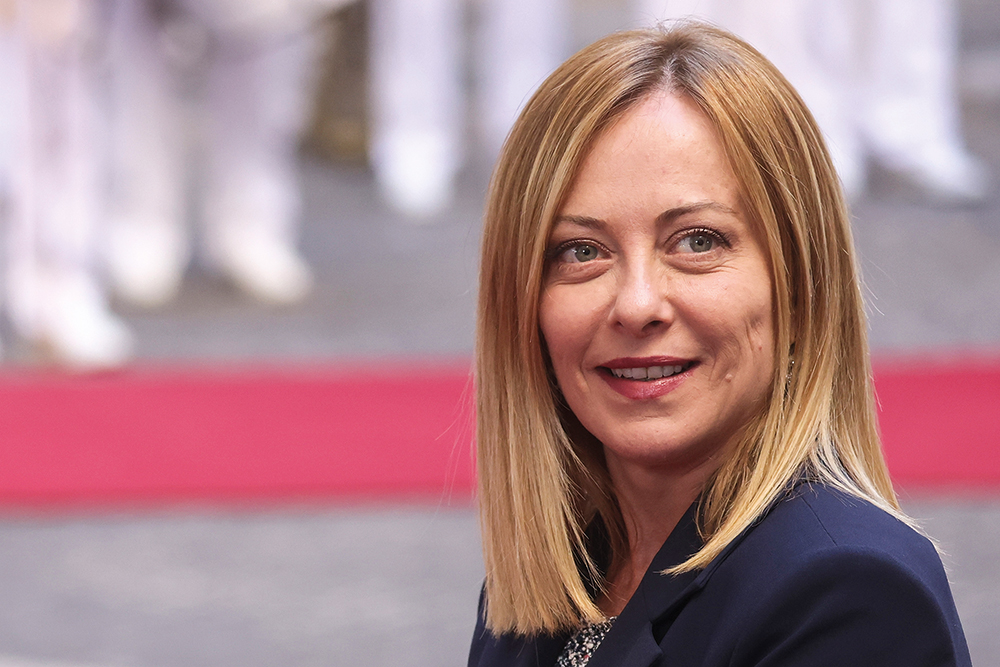Giorgia Meloni has emerged as one of the most significant politicians in Europe since she became Italy’s first female prime minister in October 2022. I Am Giorgia, already a bestseller in Italy, is her account of how a short, fat, sullen, bullied girl – as she describes her young self – from a poor, single-parent family in Rome managed to do it.
Her explanation is that she refused to play the victim and found iron in her soul – even if, as she admits, she has never found happiness. It is an amazing story: how she transformed from an ugly duckling into the swan who is now a familiar figure on the largely male-dominated world stage, and whose humor, charm, friendliness and no-nonsense talk make her such a refreshing change.
When she became Prime Minister, aged just 45, most media commentators dubbed her the “far right heir of Benito Mussolini.” Her aim, they said, was to dismantle democracy, since she and others in the Fratelli d’Italia (FdI) were once in Italy’s long-dead post-fascist party. She has not done so, and the party she co-founded in 2012, and defines as conservative, is more popular now than when the right-wing coalition she leads won the general election. That is almost unheard of for a party in government in the West. It is even rarer in Italy, where, since the fall of fascism in 1945, there have been 69 governments.
Meloni’s insistence that Italy should be close to America – very different to most European leaders’ default position of resentment – led to a close rapport with Joe Biden, and continues now with Donald Trump. Biden saw her as a “good friend” and Trump, who thinks her “a fantastic woman,” phones her when he wants to talk to Europe.
It helps that she speaks good English, which, she tells us, she taught herself as a teenager, listening to pop music on her Walkman during long bus trips to and from school (a favorite was Michael Jackson). She dreamed of being an interpreter, and did well at school, but could not afford university.
The title of the book is taken from an impassioned speech that Meloni gave in October 2019 at a right-wing coalition rally in Rome, when she bellowed:
They want to call us parent 1, parent 2, gender LGBT, citizen X, with code numbers. But we are not code numbers… and we’ll defend our identity. I am Giorgia. I am a woman. I am a mother. I am Italian. I am Christian. You will not take that away from me!
The speech, which captures the essence of her politics, was so talked about it made her a social media star and caused support for the FdI to surge. It was even turned into a disco dance track designed to embarrass her, but which instead became a smash hit that made young people warm to her. At the May general election the year before, the party had received only 4 percent of the vote; but at the 2022 general election it got 26 percent – much more than any other party – and is now polling 30 percent.
Perhaps the key figure in Meloni’s life is the father she barely knew
This book, first published in Italy before Meloni came to power, avoids virtually all mention of Mussolini and fascism – which I understand, but I think is a mistake. Meloni should have spelled out why she and her party, despite their roots, are conservative. She might have written more, too, on how she has been inspired by the late Roger Scruton – whom she calls “the prince of British conservative thought.” And she could have outlined the key differences between conservatism and fascism, which are too often falsely lumped together, owing to the still dominant Marxist view of fascism as a bourgeois counter-revolution.
I would also have liked more on why Meloni and the Italian right in general since the 1970s are so besotted with J.R.R. Tolkien. Why do they identify with hobbits in the idyllic little world of the Shire, while outside the mustering forces of evil prepare to engulf them? As a youth member of the post-fascist party, Meloni and her companions would stage hobbit plays in the park, in which she invariably took the role of Sam Gamgee, her favourite Tolkien character. “He’s just a hobbit – a gardener by trade. Yet without him Frodo would never have competed his mission,” she writes.
Perhaps the key figure in Meloni’s life is the father she barely knew, whose name – Francesco – she even refuses to write. He was an accountant and abandoned her mother Anna, her elder sister Arianna and herself when a baby. Francesco had wanted Anna to have an abortion (still illegal in Italy in 1976); but on her way to the backstreet clinic, Anna changed her mind. Meloni was born thanks only to her mother’s decision to defy her father. He then sailed off in a yacht to the Canary Islands to open a restaurant. (It later emerged he received a nine-year jail sentence in 1995 for drug-running.) The two sisters would fly out to visit him in the summer holidays, but he showed them no love, and, aged 11, Meloni decided not to see him again.
When he died “a few years ago… I felt nothing,” she writes. But it made her realize “just how deep the black hole was I had buried my pain in – the pain of not being loved enough.” It was her father’s emotional, not physical, abandonment that drove her rise to the top – because she would then spend her life “competing with men (not with women), seeking their approval, friendship… all of it because of that wound.”

























